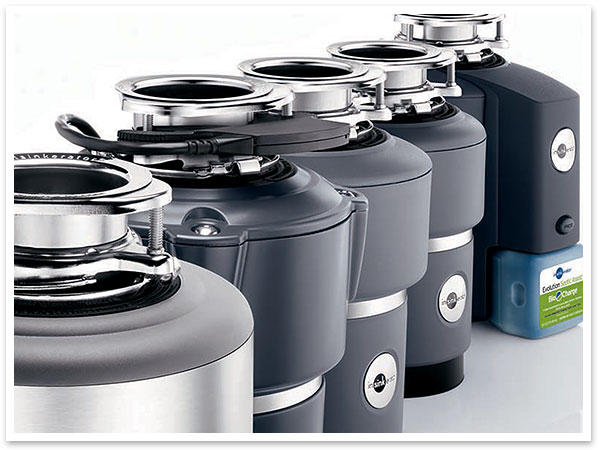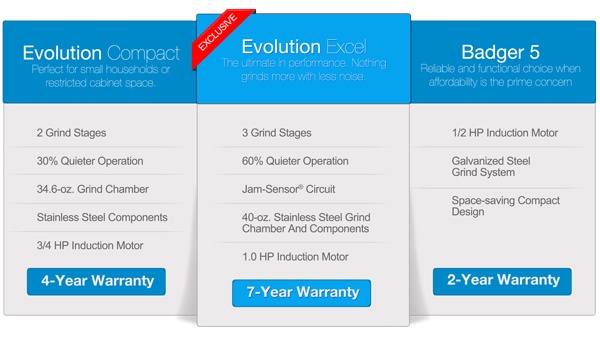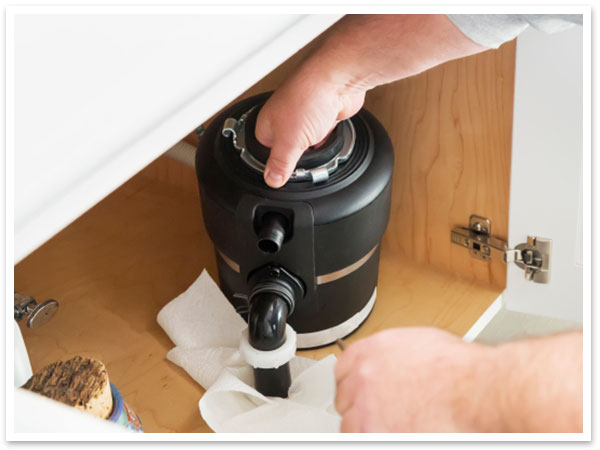Garbage Disposal Repair & Replacement

Grind More. Hear Less.
It may not be the fanciest gadget in your kitchen, but your humble garbage disposal plays a large role in keeping your kitchen clean from food odors and bacteria. In the 1970s and 1980s, they were considered a “modern convenience” for the affluent, but today, nearly half the homes in America have one.

Whether you’re building a new home or replacing an old model, consider these factors before purchasing a sub-par garbage disposal:
- Plumbing system compatibility: See if your plumbing and sewer hookups are compatible with a disposal and, if so, what kind. Some municipalities have banned disposals. Make sure your city and your neighborhood allow disposal use.
- The type of garbage disposal: There are two common types of garbage disposals. A continuous feed model will run as long as you leave the switch on. Batch feed models only run when the disposal cover is in place, allowing you to dispose of a limited amount of food at a time. Continuous feed models are the most common. They allow for disposal of more waste at one time.
- The power of the garbage disposal: Disposals range from one-fourth horsepower motors to one horsepower motors. The amount of horsepower has the largest impact on cost. Think about the size of your household and how much waste you’ll be disposing before investing in a high-horsepower model.
- Dishwasher drain connection: This allows food particles in the dishwasher to be ground up and flushed out through the disposal system.
- Disposal materials: Disposals with stainless steel components help prevent corrosion. If you’re building a new home or want to delay future repairs, consider investing in one of these longer-lasting disposals.
- Noise level: Disposals can be extremely loud. Consider the environment you want in and around the kitchen. Low-volume disposals are available, but they generally cost more. If noise isn’t an issue, save money with a louder model.

The Care & Feeding of Your Garbage Disposal
Garbage disposals are designed to last about 10 years, but you can extend their life span by keeping an eye out for certain issues.
For example, it may be time for replacement if it rusts out on the bottom, and water starts spewing under your sink and onto the kitchen floor every time you turn it on.
You can prevent rust by running the disposal every time you put food in it. Otherwise, the acid and oils from standing food will eventually eat through the seals.
And when you run the disposal, always use cold water. Hot water dissolves fats and grease, but then it deposits it in your drainpipes, where it accumulates before eventually causing a clog.
Here are more tips for maintaining your disposal:
- Run cold water for 30 seconds or more after turning the disposal off to thoroughly wash ground-up food down the drain.
- You can grind almost any food waste, but don’t try to grind really fibrous foods like onion skins, celery stalks, or asparagus. Grinding ice, though, can actually help clean the disposal.
- If the disposal won’t run, check the circuit breaker or fuse and replace or reset as necessary. Also, check if the overload switch has tripped. Find the reset button at the bottom of the disposal unit and push it.
- If the motor hums but the disposal doesn’t run, you may have a jammed impeller, which is a repairable problem.
- If the disposal runs intermittently, the switch or stopper may be defective. If so, you’ll need to have it replaced.
- A leaky garbage disposal isn’t necessarily a sign of rust. The cause might be as simple as a loose connection, which can readily be tightened.
- When you your disposal starts making unusually loud noises, you’re likely trying to grind something you shouldn’t. The result could be a damaged blade, impeller, or motor. But don’t be too quick to repair, since it’s likely that it would cost less to replace.
The bottom line is that once a disposal stops doing a good job of grinding, or starts to leak, that usually means it’s time for replacement. Give it a little loving care, however, and you might get a few more years from it.
When repairs are necessary, our certified plumbers can get the job done efficiently. Contact us today to schedule garbage disposal services.
Services
The Best
Excellence, efficiency, and an enduring spirit of service are three of the core values that keep our customers coming back. Our customers’ reviews explain the F.H. Furr difference better than we ever could.
At F.H. Furr, we take pride in hiring “Absolutely The Best” technicians. But don’t just take our word for it — read the rave reviews from our satisfied customers and find out why Baltimore trusts our team with all their HVAC, plumbing, and electrical needs.


